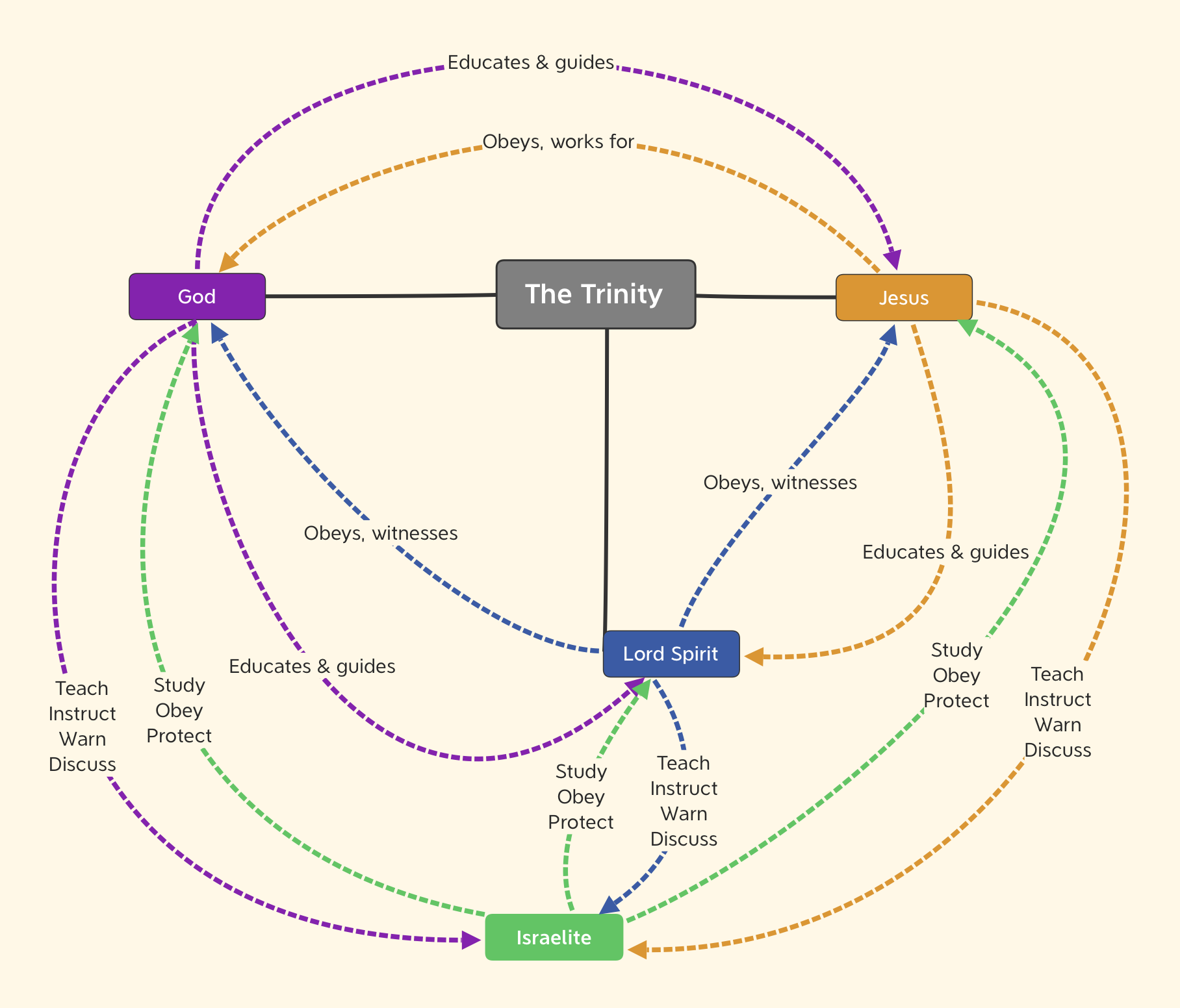 |
Index
|
Index
5 Now then, if you will obey Me faithfully and keep My covenant,
you shall be My treasured possession among all the peoples.
Indeed, all the earth is Mine,
6 but you shall be to Me a kingdom of priests and a holy nation.'”
Exodus 19:5-6a (Tanakh)
Up until the arrival of the Mosaic Contract and its encampment around the Tabernacle, God's dwelling place on Earth, Heaven had been an abstraction. But now - and especially later on with God's choice of Jerusalem for His heart and eyes - there was an existential place in which God dwelt. Here was a place which could be seen at both the Physical Level and the Spiritual Level! What a support this offered the flock! And that support increased as more details of God's dwelling place began to emerge...
[Essay: The support offered by God's existential dwelling place.]
5 Now then, if you will obey Me faithfully and keep My covenant, you shall be My treasured possession among all the peoples. (Exodus 19:5a (Tanakh))
First and foremost, the Israelite Contract is predicated on obedience:
Note that, simce obedience is tracked and monitored in real-time, the current version of the Covenant is necessarily implied. Today, for example, the current version is the 'Messianically Amended Covenant'.
"'Now then, if you will obey Me faithfully and keep My covenant, you shall be My treasured possession among all the peoples.
"'Indeed, all the earth is Mine, but you shall be to Me a kingdom of priests and a holy nation.' These are the words that you shall speak to the children of Israel.” (Exodus 19:5-6 (Tanakh))
The Lord God, in setting up the Israelite Contract, does so with the express intention that Israel exist as a Kingdom obedient to and dependent upon their King.
Note that 'obedience' is necessary if the House of Israel is to exist as a Kingdom!
[Dissertation: The nations are forcing Israel to exist as a two-nation state with the Palestinians.]
5 Now then, if you will obey Me faithfully and keep My covenant, you shall be My treasured possession among all the peoples.
Indeed, all the earth is Mine, 6 but you shall be to Me a kingdom of priests and a holy nation.'” Exodus 19:5-6a (Tanakh)
Israel's identity:
5 Now then, if you will obey Me faithfully and keep My covenant, you shall be My treasured possession among all the peoples.
Indeed, all the earth is Mine, 6 but you shall be to Me a kingdom of priests and a holy nation.'” Exodus 19:5-6a (Tanakh)
Identity and function offer an insight into Israel's consideration.
Some benefits:
Implied:
Some detriment:

A brief glance at the implications above, suggests that there are implications to the implications!
In order to teach, direct, warn, and deal with mankind's bafflling questions, there must necessarily be two-way conversation between the parties. The Father speaks directly, but also through His Son and the Lord Spirit. Hence the Son and the Lord Spirit are also parties to the Israelite Contract. Note how the Trinity-consideration is extended with the integration of the Israelites into the Israelite Contract:

Israelite Contract - Consideration
With the shift of the Ark into Jerusalem, the 'Israelite Priesthood' became the 'Priesthood in the Order of Zion'. As specialists, they were expected to study and learn about God as much as they were able. For only then could they go out into the world and produce fruit.
Their obedience was required.
Interestingly, the schematic includes 'protect' as a part of the detriment they will suffer. They are to protect:
The Jerusalem wall represents protection, safety, and security. With a lack of interest in safeguarding the Covenant and the Jerusalem wall,
23 The word of the LORD came to me: 24 O mortal, say to her: You are an uncleansed land, not to be washed with rain on the day of indignation. 25 Her gang of prophets are like roaring lions in her midst, rending prey. They devour human beings; they seize treasure and wealth; they have widowed many women in her midst. 26 Her priests have violated My Teaching: they have profaned what is sacred to Me, they have not distinguished between the sacred and the profane, they have not taught the difference between the unclean and the clean, and they have closed their eyes to My sabbaths. I am profaned in their midst. 27 Her officials are like wolves rending prey in her midst; they shed blood and destroy lives to win ill-gotten gain. 28 Her prophets, too, daub the wall for them with plaster: They prophesy falsely and divine deceitfully for them; they say, “Thus said the Lord GOD," when the LORD has not spoken. 29 And the people of the land have practiced fraud and committed robbery; they have wronged the poor and needy, have defrauded the stranger without redress. 30 And I sought a man among them to repair the wall or to stand in the breach before Me in behalf of this land, that I might not destroy it; but I found none. 31 I have therefore poured out My indignation upon them; I will consume them with the fire of My fury. I will repay them for their conduct—declares the Lord GOD. (Ezekiel 22:23-31 (Tanakh))
... the Lord is forced to shift the Covenant, Jerusalem, and the Jerusalem wall to the Spiritual Level:
5 I looked up, and I saw a man holding a measuring line. 6 “Where are you going?" I asked. “To measure Jerusalem," he replied, “to see how long and wide it is to be.” 7 But the angel who talked with me came forward, and another angel came forward to meet him. 8 The former said to him, “Run to that young man and tell him:
“Jerusalem shall be peopled as a city without walls, so many shall be the men and cattle it contains. 9 And I Myself—declares the LORD—will be a wall of fire all around it, and I will be a glory inside it. (Zechariah 2:5-9 (Tanakh))
The vilification and annulment of the Covenant by Paul et al, totally destroys the consideration and relationships found in the Israelite Contract. Pauline new-covenant doctrine replaces the living dynamic with 'faith'. And as Jesus said, mankind's faith doesn't even get close to that of the tiny mustard seed:
[20-21] He replied, "Because you have so little faith. I tell you the truth, if you have faith as small as a mustard seed, you can say to this mountain, 'Move from here to there' and it will move. Nothing will be impossible for you." (Matthew 17:20-21 NIV)
Clearly, faith alone is inadequate. And so Paul's spiritual blindness rears its ugly head once again, for he fails to understand the Covenant and the faith demanded by it.
[Dissertation: The amendments introduced by the Israelite Contract cascade to other areas of the Covenant.]
As one might expect, up until the Israelite contract, worship had been conducted on an informal and family basis right up until the time of Job. This state of worship can be seen in the Book of Job, which immediately precedes the Mosaic Covenant on the timeline.
4 It was the custom of his [Job's] sons to hold feasts, each on his set day in his own home. They would invite their three sisters to eat and drink with them. 5 When a round of feast days was over, Job would send word to them to sanctify themselves, and, rising early in the morning, he would make burnt offerings, one for each of them; for Job thought, “Perhaps my children have sinned and blasphemed God in their thoughts.” This is what Job always used to do. (Job 1:4-5 (Tanakh))
The Book of Job provides details of the failure of the church at that time. This review, which the Lord has made available to the community, would not have been the only assessment of the church. So although change to the Covenant was needed, it would have to await a more suitable time.

Right up until the time of Job, sacrfices had been carried out in the open fields;
1 The LORD spoke to Moses, saying:
2 Speak to Aaron and his sons and to all the Israelite people and say to them:
This is what the LORD has commanded: 3 if anyone of the house of Israel slaughters an ox or sheep or goat in the camp, or does so outside the camp, 4 and does not bring it to the entrance of the Tent of Meeting to present it as an offering to the LORD, before the LORD's Tabernacle, bloodguilt shall be imputed to that man: he has shed blood; that man shall be cut off from among his people. 5 This is in order that the Israelites may bring the sacrifices which they have been making in the open—that they may bring them before the LORD, to the priest, at the entrance of the Tent of Meeting, and offer them as sacrifices of well-being to the LORD; 6 that the priest may dash the blood against the altar of the LORD at the entrance of the Tent of Meeting, and turn the fat into smoke as a pleasing odor to the LORD; 7 and that they may offer their sacrifices no more to the goat-demons after whom they stray. This shall be to them a law for all time, throughout the ages.
8 Say to them further: If anyone of the house of Israel or of the strangers who reside among them offers a burnt offering or a sacrifice, 9 and does not bring it to the entrance of the Tent of Meeting to offer it to the LORD, that person shall be cut off from his people. (Leviticus 17:1-9 (Tanakh))
Now, however, with the introduction of the Israelite Contract, the Lord made one of many significant changes to the Covenant. Further explanations cover the Representation of Jesus and the Representation of the sinner, with regard to sacrifices.
[Dissertation: The Israelite Contract and the changes in worship it brought to the Covenant.]
Here are some examples:
[Dissertation: The Mosaic Contract and infrastructure.]
[Assignment:Discuss the effect that the Messianic Amendment had on Covenant infrastructure.]
In creating mankind, the Lord God wished to create them in His likeness. But first He creates them in His image. He then creates them in His likeness by granting mankind limited authority:
27 And God created man in His image, in the image of God He created him; male and female He created them. 28 God blessed them and God said to them, “Be fertile and increase, fill the earth and master it; and rule the fish of the sea, the birds of the sky, and all the living things that creep on earth.” (Genesis 1:27-28 (Tanakh))
The Covenant is a framework which offers guidance at two levels:
Initially, Covenant Law was dominated by a list of do's and dont's. But, with the destruction of the Temple, the Covenant became unenforceable at the Physical Level. The annulment of the Covenant by Paul et al only made matters worse. However, Jesus shifted the Law to the Spiritual Level, requiring mankind to evaluate the two abstract rules - an altogether more difficult proposition requiring commitment, knowledge, and understanding.
Obedience to the Law allows people to dwell with the Lord safely, since it is geared to the avoidance of sin and finding forgiveness for unintentional wrongdoing.
However, Israel were, and still are, required to be a team of experts God could send out to the nations to work in the fields and bring in much fruit. To a certain extent, the Law offers some guidance.
It is limited because the Law doesn't know an individual's or group's abilities, status, circumstances, or contacts within society. Each person occupies a unique place in society despite the inevitable overlap.
And so the Covenant contains both the Law, which will handle daily life in God's presence, and Face-to-face interaction in order to deal with cries for help, finding answers to baffling questions, and for directions which will enable people to bring in much fruit. For without fruit there can be no redemption:
[19] Every tree that does not bear good fruit is cut down and thrown into the fire. (Matthew 7:19 NIV)
Probably, the vast majority of people will learn about God and come to 'know' Him in an academic sense. This was the case with Job:
[4] 'Hear, and I will speak; I will question you, and you declare to me.' [5] I had heard of you by the hearing of the ear, but now my eye sees you; (Job 42:4-5 NRSV)
An academic knowledge and experience of God is, perhaps, somewhat impersonal. So, the Lord wants people to transition from an academic experience to one where there is also face-to-face contact and open discussion.
Pauline doctrine goes against God's wishes for, having defiled and annulled the covenant, it goes on to espouse reliance on faith and conscience.
[1] I speak the truth in Christ---I am not lying, my conscience confirms it in the Holy Spirit--- (Romans 9:1 NIV)
The result is pandering, as can be seen here:
[9] Be careful, however, that the exercise of your freedom does not become a stumbling block to the weak. [10] For if anyone with a weak conscience sees you who have this knowledge eating in an idol's temple, won't he be emboldened to eat what has been sacrificed to idols? [11] So this weak brother, for whom Christ died, is destroyed by your knowledge. [12] When you sin against your brothers in this way and wound their weak conscience, you sin against Christ. [13] Therefore, if what I eat causes my brother to fall into sin, I will never eat meat again, so that I will not cause him to fall. (1 Corinthians 8:9-13 NIV)
Notice how Paul abandons the weak person. Paul fails to correct and teach simply because he has defiled and annulled the Covenant. But, in defiling the Covenant, Paul has also defiled and trashed the Book of Teaching.
With the loss of the Book of Teaching, pandering has reached new levels of evil and depravity. The outlook is bleak indeed (see Evil - exponential growth).
See: Covenant Model.
A study of the Book of Job shows that the Post-Eden Covenant was falling short, and was in need of revision. While the Post-Eden Covenant had proved effective following the Fall, the context was changing as expansion and progress moved inexorably forward. Of course, the Lord was keeping a watchful eye on the Covenant, and therefore picked up on what had been taking place over the years. The Lord, however, doesn't act on impulse. And He finds some of the evidence He requires in the verbatim record of what took place between Job and his three friends. Note how the Lord goes straight to the original words. That evidence is included in Scripture for our understanding and guidance. To understand what was happening at the time of Job was to understand the need to implement the Israelite contract and revision of the Covenant. The changes to the Covenant are not implemented immediately, but must await the right time and place. Timing is important!
The Covenant and its Law provides some guidance as to how outreach is to be approached. However, the Covenant, dealing as it does with generalities, has no knowledge of an individual's place in society.
Each person has a unique circle of family, friends, colleagues, and aquaintences. Not only that, but each individual or group occupies a unique place within the world in terms of work-place, education, recreational activities, and interests. All of these things are, of course, known to the Lord.
And so, in order to exploit that unique access, the Lord God requires individuals or groups to approach Him personally, and ask Him how they may help with the harvest of lost souls. The ensuing discussion won't be easy, and mistakes may be made. Nevertheless, it is that face-to-face discussion which will help to uncover how the Lord wishes to use our abilities and unique place in the world. Obedience to the Lord's wishes will then lead to a productive life:
[4] Remain in me, as I also remain in you. No branch can bear fruit by itself; it must remain in the vine. Neither can you bear fruit unless you remain in me. [5] “I am the vine; you are the branches. If you remain in me and I in you, you will bear much fruit; apart from me you can do nothing. (John 15:4-5 NIV)
Compare that with those who thought they'd been doing the Lord's will, but hadn't. Their faith in Jesus didn't save them:
[21] Not every one who is saying to me Lord, lord, shall come into the reign of the heavens; but he who is doing the will of my Father who is in the heavens.
[22] Many will say to me in that day, Lord, lord, have we not in thy name prophesied? and in thy name cast out demons? and in thy name done many mighty things?
[23] and then I will acknowledge to them, that -- I never knew you, depart from me ye who are working lawlessness. (Matthew 7:21-23 YLT)
Version: 2024-11-16